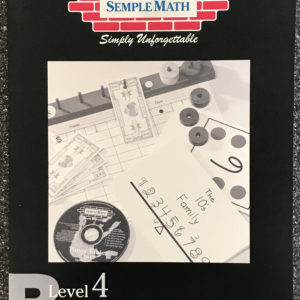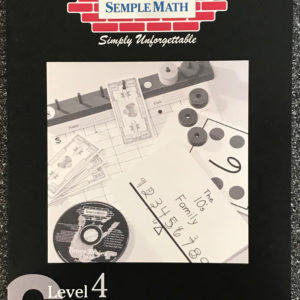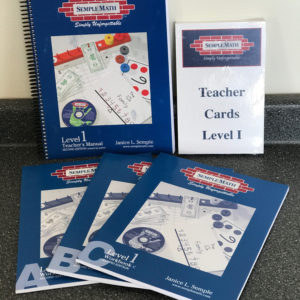Complete Level Four Set
$93.80
Description
Scope and Sequence Numeration: Review and expand skills from Levels I, II, and III. Amounts to the billions.
Operations: Review and expand addition, subtraction, and multiplication. Introduce the concept of division, the vocabulary of division, division, long division, remainders, zero in division, and regrouping in division.
Place Value: Review and expand knowledge of place value. Apply previously learned skills to billions; continue associations with people living in houses on Whole Number Street. Use images to help students form an understanding of the concept of place value.
Organizational Skills: Review procedures for setting up and interpreting math problems. Skills presented in a specific sequence induce aptitude for self organization. Scripted dialogs between teacher and student keep student processing at the cognitive level.
The Checkbook: Continued use of the checkbook and the language of the banking system, used in conjunction with a behavior modification program.
Word Problems: Review and expand skills from Levels I, II, and III. Continue building an abstract vocabulary in word problems. Introduce mathematical vocabulary and connect it with Semple Math’s image-making vocabulary.
Money: Continue to review and reinforce both abstract and image-making terms. Emphasize the connection between fractions and coins.
Base 10 Structures: Review and reinforce concept of Base 10. Review mnemonics for helping students to understand place value. Mnemonic images bring structures to life.
Rounding and Estimating: Review rounding from previous Levels. Introduce estimating. Use two rounded numbers to estimate total.
Fractions: Review fractions, decimals, and percents. Introduce LCM and LCD. Add, subtract, multiply, and divide like and unlike fractions. Change fractions to decimals, and decimals to fractions. Change mixed numbers to improper fractions, and improper fractions to mixed numbers.
Building Self-Esteem: Use success as a motivator. Continued use of mnemonics and a special sequence of skills enables all students to succeed.
Develop Thinking Skills: The questioning techniques in the form of scripted dialogs require students to pay attention, think, compare, analyze, and make decisions.
 Printable Order Form
Printable Order Form Order Now
Order Now



